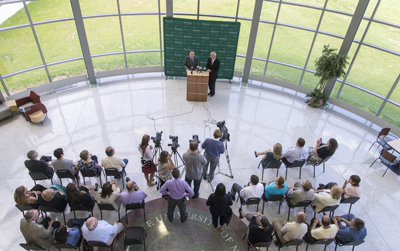
Binghamton University receives $12.8 million for innovative energy research
The NorthEast Center for Chemical Energy Storage (NECCES) at Binghamton University has been awarded a $12.8 million, four-year grant, announced by U.S. Energy Secretary Ernest Moniz. One of 32 grants awarded for a total of $100 million to fund Energy Frontier Research Centers (EFRCs), it will help accelerate the scientific breakthroughs needed to build a new 21st-century energy economy.
“We are mobilizing some of our most talented scientists to join forces and pursue the discoveries and breakthroughs that will lay the foundation for our nation’s energy future,” Secretary Moniz said. “The funding we’re announcing today will help fuel innovation.”
The NECCES at Binghamton University is directed by M. Stanley Whittingham, distinguished professor of chemistry and of materials science at Binghamton. The grant is one of the largest federal research grants Binghamton University has received.
“Stan Whittingham is a pioneer in the development of lithium ion batteries and his research has already had a phenomenal impact on our society,” said President Harvey Stenger. “Receipt of this highly competitive grant will enable Stan and his colleagues to continue to push the boundaries of energy storage and battery life, and underscores the value of the work Binghamton University researchers are involved in every day.”
“This grant illustrates the quality and importance of smart energy research at Binghamton,” said Bahgat Sammakia, vice president for research and distinguished professor of mechanical engineering. “Batteries are essential to improving technology in so many ways, whether it’s portable electronics; smart grids, which enhance security and save energy; green energy harvesting such as solar and wind; or data centers, which require a backup energy source.”
“Stan Whittingham’s center competed against proposals from top schools around the country and won,” Sammakia said. “It’s an endorsement of him and speaks to the high caliber of his research.”
“The research I have been involved with for over 30 years has helped advance how we store and use energy at a very foundational level – through batteries that, among other things, power most laptop computers,” Whittingham said. “This infusion of funding for the work that I do with my colleagues in the NorthEast Center for Chemical Energy Storage will allow our work to continue as we seek to improve on current methods for energy storage in a way that will impact everyone around the globe.”







